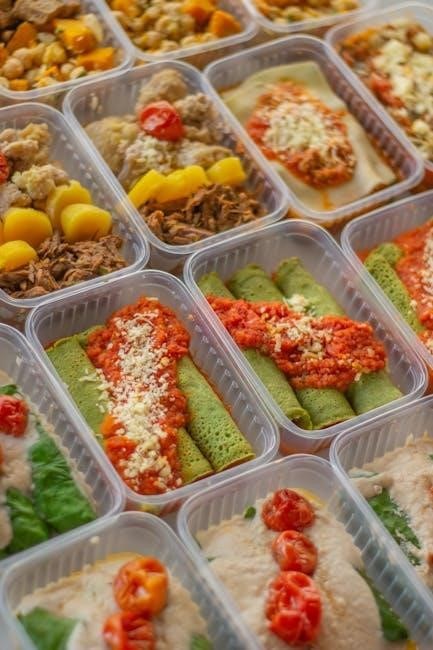Proper nutrition is crucial for marathon success. A well-structured meal plan ensures optimal energy levels and endurance, helping avoid mistakes and digestive discomfort, maximizing race performance effectively.
Why Nutrition Matters in the Final Week
The final week before a marathon is critical for optimizing performance. Proper nutrition ensures glycogen stores are maximized, reducing fatigue risk. Avoiding dietary experimentation prevents digestive discomfort, while tailored meal plans support energy needs. Glycogen loading is essential, focusing on complex carbs like whole grains and pasta. Protein intake should remain moderate to preserve muscle function, while minimizing fiber and sugar prevents stomach issues. Hydration is equally vital, with electrolytes balancing fluid levels. A well-planned diet avoids last-minute health setbacks, ensuring peak physical condition. Consistency and avoiding drastic changes are key, as poor choices can hinder performance. For diabetics, sticking to a pre-agreed plan with medical guidance is crucial. This period fine-tunes the body, making nutrition a cornerstone of race preparation.

Understanding the Importance of Carbohydrate Loading
Carbohydrate loading maximizes glycogen stores, providing sustained energy during the marathon. It prevents fatigue and enhances endurance, making it a cornerstone of pre-race nutrition strategies.
How to Implement Carbohydrate Loading Effectively
Start carbohydrate loading 2-3 days before the race to maximize glycogen stores. Focus on high-carb foods like pasta, rice, and bread, while reducing fat and fiber intake to minimize digestive issues. Aim for 8-12 grams of carbs per kilogram of body weight daily. Include complex carbs in meals and snacks, such as oatmeal, bananas, and whole grains. Avoid heavy protein or fatty foods that can slow digestion. Stay hydrated to help absorb nutrients and maintain energy levels. Pair carbs with small amounts of protein for balanced meals. Avoid overeating to prevent bloating or discomfort. Tailor portions based on individual calorie needs and training intensity. This strategy ensures optimal energy reserves for race day, delaying fatigue and enhancing performance.

Hydration Strategies for Marathon Success
Proper hydration is key to marathon performance. Start hydrating a week before the race, drink 8-10 glasses of water daily, and include electrolyte-rich drinks to prevent cramps. Avoid overhydration.
Best Practices for Fluid Intake Before Race Day
Proper hydration is essential for marathon performance. Start increasing fluid intake a week before the race, aiming for 8-10 glasses of water daily. Incorporate electrolyte-rich beverages to maintain sodium and potassium levels, which help prevent cramps. Avoid overhydration, as it can lead to hyponatremia. Monitor urine color; it should be pale yellow, indicating adequate hydration. Adjust fluid intake based on weather conditions—more in heat, less in cold. Practice your hydration strategy during training runs to ensure it works for you. Avoid caffeine and alcohol, as they can dehydrate you. On race morning, drink 16-20 ounces of fluid 1-2 hours before start time. Stick to familiar drinks to avoid stomach issues.
Protein and Fat Intake in the Week Before a Marathon
Balancing protein and healthy fats is key for energy and muscle repair. Focus on lean meats, fish, and plant-based options, while minimizing heavy, fatty meals pre-race.
Balancing Macronutrients for Optimal Performance
Balancing carbohydrates, proteins, and fats is essential for marathon performance. Carbohydrates provide energy, proteins support muscle repair, and fats offer sustained endurance. Aim for a 55-65% carb intake, 15-20% protein, and 20-25% fats. Prioritize complex carbs like whole grains, lean proteins such as chicken or fish, and healthy fats from nuts and avocado. Avoid heavy, fatty meals close to race day to prevent digestion issues. Hydration and electrolyte balance are also critical, as they prevent cramps and fatigue. Tailor your diet to suit your training phase, gradually increasing carb load in the final days. Listen to your body’s needs and adjust your intake to maintain peak performance and overall health. Proper balance ensures you’re fueled optimally for race success.
Fiber and Sugar Consumption Guidelines
Reduce high-fiber foods to avoid digestive discomfort. Opt for low-fiber, easily digestible carbs and moderate sugar intake to maintain energy levels and prevent stomach issues during the race.
Managing Digestive Health Through Diet
A well-balanced diet is key to maintaining digestive health during marathon preparation. Focus on easily digestible carbs, lean proteins, and minimal fiber to avoid stomach discomfort. Avoid heavy, fatty, or spicy meals that can cause bloating or cramps. Incorporate foods like bananas, toast, and lean meats, which are gentle on the stomach. Stay hydrated to prevent constipation and ensure proper nutrient absorption. Avoid experimenting with new foods or supplements in the final week to minimize digestive risks. Opt for bland, low-fiber options to reduce the likelihood of gastrointestinal issues on race day. A consistent and predictable diet helps maintain digestive stability, ensuring you feel your best during the marathon.
- Avoid high-fiber foods to reduce digestive strain.
- Incorporate easily digestible carbs and lean proteins.
- Stay hydrated to support overall digestive function.
- Avoid new or heavy meals that may cause discomfort.

Electrolytes and Supplements in Marathon Preparation
Electrolytes like sodium and potassium are vital for hydration and muscle function. Avoid deficiencies to prevent cramps and fatigue. Consider supplements only after consulting a professional for safety.
Essential Nutrients to Avoid Cramps and Fatigue
Proper electrolyte balance is key to preventing cramps and fatigue. Sodium and potassium are crucial for maintaining fluid balance and nerve function. Magnesium supports muscle relaxation and energy production. Include potassium-rich foods like bananas, spinach, and sweet potatoes, while sodium can be replenished through sports drinks or table salt. Magnesium can be found in nuts, seeds, and whole grains. Additionally, calcium plays a role in muscle contractions, so incorporate dairy or fortified foods. Staying hydrated and consuming these nutrients consistently in the final week ensures optimal performance. Avoid sudden changes in diet to prevent digestive issues. Tailor your intake based on individual needs and race conditions to maintain peak performance.
Common Mistakes to Avoid in Marathon Meal Planning
One major mistake is overloading on unfamiliar or high-fiber foods the week before the race, which can cause digestive discomfort. Avoid drastic changes to your diet, as this can disrupt your system. Many runners forget to stay hydrated consistently, leading to fatigue. Consuming too much sugar or caffeine close to race day can also cause energy crashes. Overeating the night before is another pitfall; opt for balanced, light meals instead. Additionally, neglecting electrolyte intake can result in cramps and performance issues. Plan meals carefully, stick to familiar foods, and avoid experimenting to ensure a smooth race experience. Proper preparation and moderation are essential for peak performance.
Sample Meal Plans for the Week Before a Marathon
A well-structured meal plan is essential for marathon preparation. Start the week with complex carbs like whole-grain pasta, lean proteins such as chicken, and steamed vegetables. Mid-week, focus on oatmeal for breakfast, paired with bananas and honey for energy. Include quinoa salads with grilled fish or tofu for lunch, and brown rice with turkey or plant-based alternatives for dinner. Avoid heavy meals and opt for easily digestible foods like yogurt, smoothies, and toast. On the eve of the race, prioritize a balanced meal with pasta, marinara sauce, and a side of green vegetables. Avoid high-fiber or spicy foods to prevent digestive issues. Stay hydrated with water and electrolyte-rich drinks. Consistency and familiarity are key to ensuring your body is fueled for peak performance.

Timing Your Meals Correctly
Proper meal timing is vital for marathon preparation. Aim to eat complex carbohydrates, lean proteins, and healthy fats 2-3 hours before running to allow digestion. During race week, maintain consistent eating schedules to avoid stomach discomfort. On race day, consume a light, high-carb meal 2-3 hours before the start, such as toast with honey or oatmeal. Avoid heavy or fatty foods that may cause digestive issues. Hydrate with water or electrolyte drinks 1-2 hours before the race and sip water during the event. Practice your nutrition strategy during training to ensure it works for you. Timing meals correctly helps maximize energy levels, prevent cramps, and enhance overall performance. Consistency and planning are key to fueling your body effectively for the marathon.

Race Day Nutrition Strategy
Race day nutrition requires careful planning to optimize performance and avoid digestive discomfort. Start with a light, high-carb meal 2-3 hours before the race, such as toast, oatmeal, or a banana. Avoid heavy, fatty, or high-fiber foods that may cause stomach issues. Hydrate with water or an electrolyte drink 1-2 hours before the start to ensure proper fluid levels. During the race, fuel with energy gels or bananas at regular intervals, such as every 30-45 minutes, to maintain energy levels. Practice your nutrition strategy during training to ensure it works for you. Avoid trying new foods or drinks on race day to minimize risks. Stay hydrated by sipping water or sports drinks as needed, especially in hot conditions. A well-executed race day nutrition plan helps prevent cramps, fatigue, and digestive problems, ensuring peak performance. Consistency and preparation are key to success.

Leave a Reply
You must be logged in to post a comment.